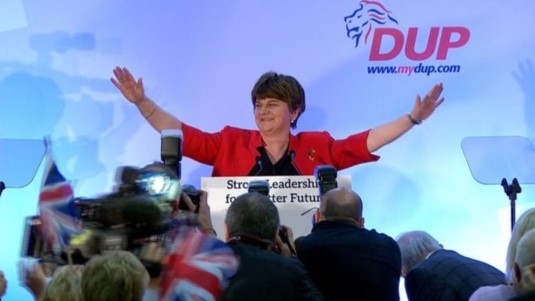
This, of course, isn't the first time in recent memory the issue of abortion in Northern Ireland was subordinate to the argy bargy of Parliamentary arithmetic. In 2008 a move to extend UK provisions to the north was blocked by ... Harriet Harman. Apparently, women's rights were so much a shibboleth when New Labour wanted to lock suspects up for 42 days without charge, and they needed the DUP's support to get it through the House. Ho hum.
What is more important and interesting is why the DUP cling to the near-ban on abortion. Consider the disposition of the people of Northern Ireland, which is somewhat complex. Drawing on research conducted in 2016, the ESRC-funded ARK project found that 63% of respondents accepted it was a woman's right to choose to have an abortion or not. There are large majorities to allow abortion in cases of foetal abnormality or threat of life to the would-be mother. Notably the agree totals for both were higher among DUP voters than either Sinn Fein or SDLP supporters. However, the same research outlined seven scenarios in which a woman may seek an abortion, ranging from the possibilities above, a pregnancy in the event of rape or incest, (non-lethal) threats to physical and mental health, to just not wanting to have children. ARK found pluralities in favour of abortion in six of the seven cases. The one they didn't was the last with 43% agreeing it should definitely be illegal vs just 17% saying it should definitely be legal. Confusing matters even further, 55% to 33% said women taking abortion pills for not wanting a child should not face criminal charges. 63% also said doctors should not face charges if they performed an abortion, and 70% thought abortion should be a matter of medical regulation not criminal law. What a confusing picture!
Why then do the DUP remain signed up to the ban? Well, the obvious answer is party members agree. It's hardly a stretch to believe that Foster and friends honestly, as much as such a thing exists in unionist circles, subscribes to backward views. And it's just as well, because abortion is inseparable from the DUP's raison d'etre. Originally the insurgent and now the establishment party of unionism, it touts itself as the representative of a "faith community". The party offers a cross-class appeal to a loyalist population defined in, well, loyalist and religious terms by Westminster, the provisions of the Good Friday Agreement and the terms of power sharing (and the statelet's political history since its formation), and has a clear commitment to maintaining the basis of the sectarian division of Northern Ireland. Shock horror, that is what unionism has always defended. Unionism, however, has always depended on a certain othering of the Catholic minority and the rest of Ireland to keep the meagre privileges it enjoys. As the weekend's win for abortion reform marks the latest episode in the long secularisation of the Republic, clinging to the abortion ban reinscribes the difference between north and south in different terms. Once, the other was papism, now it's permissiveness and immorality.
Secondly, bringing the north in line with the UK adds an unwelcome secular element to the mix. Unwelcome because as loyalism vs republicanism has so often been framed as an intractable religious conflict between Protestant and Catholic (which is the view of plenty of establishment ignoramuses), lifting the abortion ban and extending reproductive freedom undermines the religious case for the separation of the communities. Take religion completely out of the question and the divide in Northern Ireland appears as what it always has been: a political one. Thus exposed, what's the point of carrying on? The justification for dividing the population up evaporates and, suddenly, the DUP are left defending the indefensible.
Unionism is in trouble anyway. The balls up the Tories are making of Brexit has seen support for it collapse further and the desire for a united Ireland within the EU skyrocket. Culturally, unionism and the sectarian divide is decreasing in relevance for younger people as the social liberalism from within and elsewhere is doing a welcome job of worrying it away. Just as the Tories are out of ideas, the DUP have no clue how to revive support for crumbling unionism except for setting their face against change. And for as long as they keep voting with the government, Theresa May is very happy to let this continue.
2 comments:
As a Socialist but also an evangelical Christian, this is always a tricky issue. Overall a lot comes down to when one believed life begins, surely if one believes beli begins at conception as is taught by Catholic and Protestant, then abortion should not be so free.
On the point you are making. If the divisions in Ireland were truly about religion then the abortion issue should unite both sides for the reason I mention above. The fact that it doesn't proves your point, divisions in Ireland are about politics or maybe a native/settler element.
Not when life begins but rather at what point is a fetus a person? Obviously a fetus is alive but so is an animal.
Post a Comment